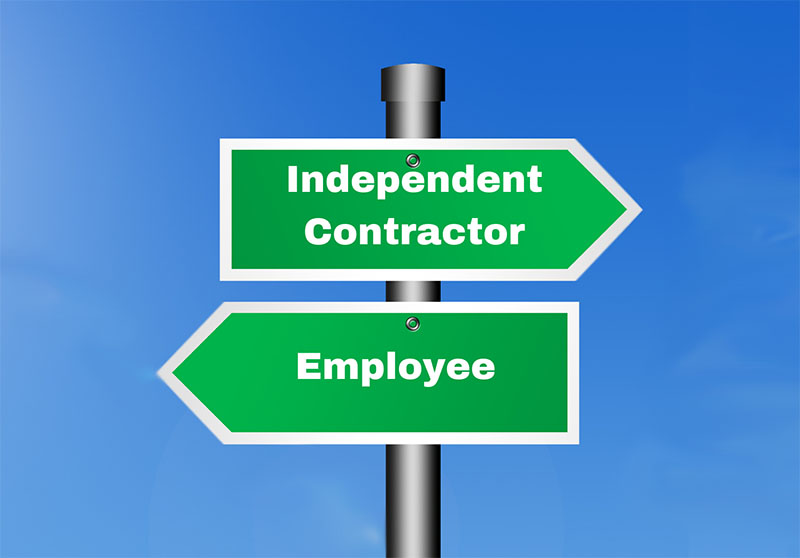The following blog article was written for Webb Law Group, APC.
On April 30, 2018, the legal classification of “independent contractor” changed. The California Supreme Court issued a decision on the Dynamex Operations West, Inc. v. Superior Court of Los Angeles case.
On that day, the California Supreme Court reinterpreted and rejected the long-standing “Borello” test. Originally, this test determined whether workers should be classified as either employees or independent contractors. Naturally, this occurred for the purposes of wage orders adopted by California’s IWC.
This decision was made in order to grant workers greater rights. It was hoped that this would encourage a more worker-friendly labor standard. Of note, the court embraced a standard which now automatically presumes all workers are employees instead of independent contractors.
Additionally, the burden of proof was now placed on businesses. Classifying an individual as an independent contractor or establishing that such classification was proper was now their responsibility.

The New “ABC” Test
This new rule of thumb is now referred to as the “ABC” test. Now, a worker will be deemed to have been “suffered or permitted to work.” Thus, an employee for wage order purposes, unless the employer proves that:
(A) the worker is free from the control and direction of the hiring entity in connection with the performance of the work, both under the contract for the performance of the work and in fact;
(B) that the worker performs work that is outside the usual course of the hiring entity’s business; and
(C) that the worker is customarily engaged in an independently established trade, occupation, or business of the same nature as the work performed.
Employee or Independent Contractor?
Now, each of the requirements must be met in order for the employer to classify a worker as an independent contractor. Additionally, proof of meeting criteria must be in place for the court to recognize that a worker has been properly classified.
The court framed its decision by characterizing the misclassification of independent contractors as harmful and unfair to workers, competitors, and the public as a whole.

Am I Still An Independent Contractor?
Understandably, this decision has upended the existing independent contractor labor market. Many workers who were originally classified as independent contractors are now, no longer legally able to be classified as such.
Whether a worker should be classified as an employee or independent contractor makes a big difference. It has considerable financial and legal significance for all parties involved. If a worker is classified as an employee, the employer bears the responsibility of paying Social Security and payroll taxes, unemployment insurance taxes and state employment taxes. Additionally, said employer must provide worker’s compensation. Finally, employers must comply with all state and federal statutes governing the wages, hours, and working conditions of employees.
Suddenly, a position which cost a company very little to fill, may now cost a considerably larger sum of money. Take the example of real estate agents. Many of these people previously worked additional full-time positions. They carried out real estate activities on the side. Why? Under classification as an independent contractor, firms like Dickson, Century 21, RE/MAX, Coldwell Banker, and others did not have to offer benefits or insurance of any kind. Most did not offer hourly wages of any kind.
Originally, many of these workers were hired as independent contractors by large firms specifically to avoid paying employees per hour worked. However, with the introduction of the “ABC” test, doing such has become much more difficult for them to justify.
Industry Impacts
Naturally, this new ruling extends into almost all industries, including that of real estate. Stipulation B of the “ABC” test is proving troublesome for many businesses that use independent contractors to provide products and services. On the surface, the test makes it difficult for real estate agents to be deemed independent contractors.
This is due to the fact that the test requires independent contractors to perform work outside the usual scope of the business. Obviously, real estate firms are in the business of marketing and selling property. Real estate agents are also typically in the business of marketing and selling property. Upon first glance, it appears that the real estate agent’s work falls inside the firm’s standard business description. Quite the conundrum.
Some critics of the decision have argued that real estate agents remain properly classified as independent contractors even after the Dynamex decision. This is due to California Business and Professions Code section 10032. This code specifically authorizes an independent contractor relationship between an agent and a real estate firm.
However, this code section was enacted to ensure that there would be liability on the part of the broker for tortious acts of the salesperson, who is an agent of the broker regardless of whether the salesperson is classified as an employee or an independent contractor. Therefore, there is some question as to whether the aftermath of the Dynamex decision applies in the context of wage and hour law.

The Challenges
Many companies across various industries now find it challenging to meet part B. Understandably, employers must show that services performed are not related in any way to the hiring entity’s business. The court illustrated the narrow circumstances in which a worker will meet this stipulation.
For example, an electrician hired by a pharmacy to repair faulty wiring will still be classified as an independent contractor. On the other hand, a mental health counselor hired by a counseling center will likely fall under the scope of regular business. As a result, mental health practitioners may now qualify as employees. Therefore, they will be taxed as such and their employer will be required to pay related taxes and insurances on said employee.
Ultimately answering whether the worker is performing work within the hiring entities usual course of business can be complicated. For example, take ride share companies like Lyft and Uber. Drivers of these ride share companies may argue that Uber and Lyft are in the business of driving people from one location to another.
Logically, drivers fall within the scope of this usual course of business. However, Uber and Lyft may argue that they are technology companies. They could claim they provide a platform for users to interact and contract various services on.
Where We Go From Here
Following the California Supreme Court’s decision, it is recommended that all California companies evaluate their independent contractor relationships. It is vital that they assess whether those relationships meet each factor of the “ABC” test. If not, independent contractors should then be properly classified as employees.
Naturally, if one or more of the factors cannot be satisfied, that company should explore whether their independent contractor relationships can be modified. If not, they may need to reclassify their independent contractors as legitimate employees.

Are You Seeking Legal Advice?
If you’re an independent contractor in California and you feel you may qualify as an employee, contact the professional team of lawyers at Webb Law Group, APC. Additionally, if your company employs independent contractors, it is advised that you take the steps to ensure that all stipulations of the “ABC” test have been met.
If you feel you may need legal advice about the independent contractors your company utilizes, Webb Law Group is here to answer any questions you have. Webb Law Group is an esteemed employment litigation firm with experience in matters involving California business law.
Having a reputable attorney by your side for matters of this nature will offer you the best possible chance of avoiding lawsuits or determining if you have a case against an employer.
If you feel that you need legal representation, we’re happy to review your legal needs and provide consultation. For questions, or to schedule a consultation, contact Webb Law Group today. We have offices in Fresno (559-431-4888) and San Diego (619-399-7700).
Are You Looking for Assistance with a Blog Campaign?
If you’re looking for an experienced and trustworthy team to execute a successful blog campaign, the staff at Wonder Web Development is here to help. We take pride in our work, care about our clients and love to see you succeed. After all, your success is a reflection on us.
Interested in learning more? Please feel free to contact the pros at Wonder Web Development for a free consultation. We can’t wait to hear from you!
You can reach us by phone at 775-527-3618 or by email at Consults@WonderWebDevelopment.com.






